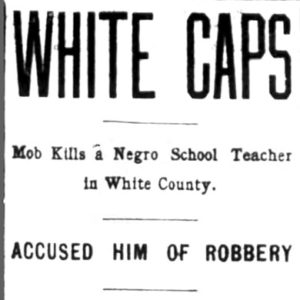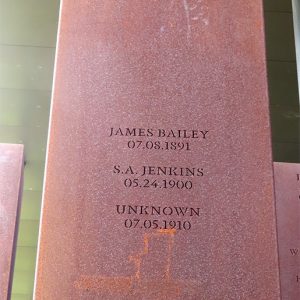calsfoundation@cals.org
S. A. Jenkins (Lynching of)
In the White County town of West Point in May 1900, whitecappers (also called nightriders) murdered a black schoolteacher named S. A. Jenkins. While this event was described in state newspaper accounts most often as an example of whitecapping, Jenkins’s murder is also typically included in tabulations of lynching victims in America.
According to news reports, two different businesses had been robbed in West Point on the night of Saturday, May 19, 1900. Apparently, Jenkins was suspected, as was another man named only Durham in reports. The name S. A. Jenkins does not match any local census data for the year 1900, and so determining his exact identity is difficult.
On the night of May 20, 1900, as the Arkansas Gazette reported, two white men “called Jenkins and Durham out, telling them they were under arrest.” Jenkins and Durham asked to see the warrants but were denied. On the way, “several more white men” accosted the pair, armed with shotguns, and demanded a confession. Jenkins ran in fright and was shot in the back by one of the men. The whitecappers “tried to make Durham confess, but did not succeed and let him go.” Reportedly, Durham did not recognize any of the attackers.
The Gazette described the event as “more ‘whitecapping’ than ‘lynching.’” The term whitecapping (or nightriding) covered a variety of vigilante practices, typically performed by men wearing disguise and/or operating under cover of darkness. Unlike lynching, whitecapping was not regularly lethal but could entail campaigns of harassment, physical violence, and terrorism, often conducted for economic purposes, though it was also sometimes used for so-called moral regulation. In his study of lynching, historian W. Fitzhugh Brundage included whitecappers in the category of “terrorist mobs.”
The murder of Jenkins may not have been a premeditated act, but it should be noted that black teachers were occasionally the targets of deadly violence in rural areas. Three years prior to the murder of Jenkins, a man named D. T. Watson was killed during the Lonoke County Race War of 1897–1898 specifically because he was an educator.
For additional information:
“State News.” Fort Smith Times, May 28, 1900, p. 2.
Untitled. Arkansas Democrat, May 26, 1900, p. 4.
“White Caps.” Arkansas Gazette, May 26, 1900, p. 1.
“Whitecappers at West Point.” Forrest City Times, June 1, 1900, p. 8.
“Whitecappers at West Point.” Southern Standard, May 31, 1900, p. 1.
Staff of the CALS Encyclopedia of Arkansas
 Civil Rights and Social Change
Civil Rights and Social Change Post-Reconstruction through the Gilded Age, 1875 through 1900
Post-Reconstruction through the Gilded Age, 1875 through 1900 S. A. Jenkins Lynching Article
S. A. Jenkins Lynching Article  White County Lynching
White County Lynching 




Comments
No comments on this entry yet.